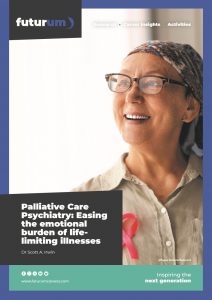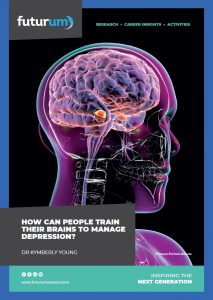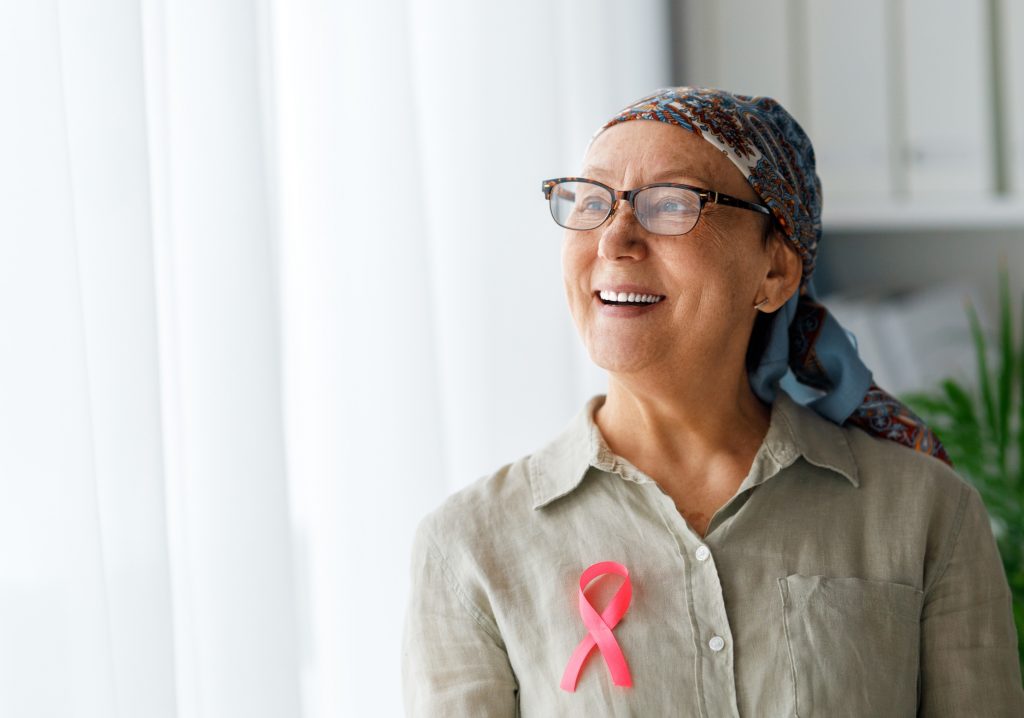
Palliative care psychiatry: easing the emotional burden of life-limiting illnesses
[[{“value”:”
Palliative care psychiatry: easing the emotional burden of life-limiting illnesses
When someone is diagnosed with a serious illness, such as cancer, the physical toll is only part of the story. Psychological distress – like depression and anxiety – can make treatment even more difficult. Dr Scott A. Irwin, Director of the Patient and Family Support Program at Cedars-Sinai Cancer in Los Angeles, USA, is working to improve care for people with cancer. He combines psychiatry with palliative care to reduce suffering and improve quality of life, not just for patients, but for their families too.
Talk like a palliative care psychiatrist
Antidepressant — a medicine used to treat depression, anxiety and other disorders
Consult-liaison psychiatry — a subspeciality of psychiatry, which focuses on both mental and physical health, based on consultation with patients and lliaisons with medical treatment teams (often in hospital settings)
Depression — a common mental health condition that causes (amongst other symptoms) persistent sadness, loss of interest and low energy
Glutamate system — a neurotransmitter of chemical signals in the nervous system
Ketamine — a medicine originally used as an anaesthetic, now sometimes used to treat pain and depression
Palliative care — medical care focused on relieving the symptoms and stress of serious illness
Psycho-oncology — the study and treatment of the psychological, social and emotional aspects of cancer
Selective serotonin reuptake inhibitor — a type of antidepressant that increases levels of serotonin in the brain to help improve mood and/or decrease anxiety
When someone is diagnosed with cancer, the focus often falls on physical treatment, which can include surgery, chemotherapy and/or radiation. However, the emotional burden can be just as serious. “Psychological distress, including depression, has a tremendous impact on patients with cancer and their families,” says Dr Scott Irwin, Director of the Patient and Family Support Program at Cedars-Sinai Cancer. “It can negatively impact treatment adherence, treatment outcomes, quality of life and even survival outcomes.”
What is palliative care psychiatry?
Palliative care psychiatry is the field that combines mental healthcare and physical healthcare for people with life-limiting conditions, such as cancer. It grew out of the fields of palliative medicine, consult-liaison psychiatry and psycho-oncology, and is still developing. “Palliative care psychiatry focuses on psychiatric issues that arise in patients with serious, potentially life-limiting medical illness, while taking into context the medical illness itself, its treatments and any psychiatric symptoms that might be caused by the illness or treatments,” explains Scott. “It is specialised for patients with complex medical illnesses being cared for in both inpatient and outpatient settings.”
What about the patient’s family?
In palliative care psychiatry, support extends beyond the patient to include their family – or whoever the patient defines as family. “Evidence shows that patients do better when their families are doing better and vice versa, so care for the family in relation to the patient’s illness, treatment or resulting distress is vital to positive outcomes for the patient,” says Scott. “In addition, patients often want family to help them with complex medical decision-making, so guiding both patients and their families through that process is greatly important.”
What role does ketamine play in palliative care psychiatry?
One aspect of Scott’s work in palliative care psychiatry involves the use of ketamine to treat severe depression in patients with serious or life-limiting illnesses. First developed as a surgical anaesthetic in the 1960s, ketamine was later found to help with cancer-related pain. Over the past two decades, researchers have discovered that low-dose ketamine administered in a professional healthcare setting can also relieve depression remarkably quickly – sometimes within minutes – with effects lasting for days or even weeks. Traditional antidepressants (selective serotonin reuptake inhibitors) often take weeks to work and help only about 30% of patients. However, ketamine, which works though the glutamate system, appears effective for around 75% of patients. “Ketamine has also been shown to rapidly decrease thoughts of self-harm or suicide. This means that patients in an emergency department or cancer care setting might be treated and able to return home with close outpatient follow-up, rather than be admitted to a psychiatric hospital,” explains Scott. The outpatient follow-up is incredibly important here – being closely monitored is what makes ketamine safe for medical treatment. If you have a mental health concern, it is vital you consult a trusted adult or support organisation. (For mental health support, see the phone numbers and weblinks at the bottom of this article.)
Reference
https://doi.org/10.33424/FUTURUM594
@Yuganov Konstantin/Shutterstock
“Evidence shows that patients do better when their families are doing better and vice versa,” explains Scott.
@DC Studio/ Shutterstock
@UnderhilStudio/Shutterstock

What are the risks of ketamine use in cancer and hospice patients?
While ketamine is an invaluable tool in palliative care psychiatry, safety is always a priority. “The risks at antidepressant dosages are fairly minimal and do not occur very often,” explains Scott. “Most of our information for side effects come from the much higher doses used for anaesthesia during surgery or cancer pain treatment.” Patients are typically monitored to catch any changes in blood pressure, heart rate or breathing. Some may experience temporary symptoms like nausea, dizziness or vivid dreams, but these are rare and usually short-lived. Use of ketamine is avoided in patients who have certain health issues, such as glaucoma, brain tumours or increased pressure in the skull, as ketamine’s potential effect on blood pressure could make these conditions worse.
How widely is ketamine being used in palliative care psychiatry today?
Ketamine is becoming more common in mental health treatment, especially since the US Food and Drug Administration approved a nasal spray version, Spravato, for treatment-resistant depression and, more recently, for depression in general. “In palliative care psychiatry, where time may be of the essence, the time it takes for traditional antidepressants to take effect and the failure rates of these antidepressants can delay relief, and drug-drug interaction and/or side-effect profiles may be more pronounced, ketamine is being put to greater use,” explains Scott.
What is next for Scott’s research?
While Scott continues to study ketamine, his research focus has shifted towards exploring how palliative care psychiatry more broadly affects patient outcomes and healthcare use. He is also interested in finding better ways to make mental health treatments more accessible, especially for people with serious illnesses.
“While my ketamine research continues, it has become a smaller part of my ‘research portfolio’,” says Scott. “A nice thing about academia or academic medicine is that one has the opportunity to follow many paths of interest, and you can always change the path you are on.”
Emergency mental health support:
In the US, call or text the 988 Suicide & Crisis Lifeline at 988.
In the UK, call 999 or talk to an adult you trust and ask them to call 999.
 Scott A. Irwin, MD, PhD
Scott A. Irwin, MD, PhD
Cedars-Sinai Cancer, Department of Psychiatry and Behavioural Neurosciences, Cedars-Sinai Health System, Los Angeles, USA
Fields of research: Palliative care psychiatry, psycho-oncology
Research project: Supporting patients with life-limiting illnesses and their families through palliative care psychiatry
Funders: Scott has worked with a range of funders over the years, including the US National Cancer Institute (NCI), National Institute of Mental Health (NIMH), and the National Palliative Care Research Center (NPCRC)
About palliative care psychiatry
As Scott’s work demonstrates, palliative care psychiatry focuses on improving the quality of life and outcomes for patients with life-limiting illnesses (such as cancer) and their families. The work is deeply human-centred. “My research has always been inspired by seeing what my patients need, or where there may be gaps, and trying to fill those,” says Scott. “When patients are facing serious, often life-limiting illnesses, I personally find the impact of meeting their needs feels greater, more tangible.”
Research in palliative care psychiatry is advancing rapidly, with some of the most exciting developments occurring within the fields of neuroscience and psychiatry. “The ‘holy grail’ of psychiatry research for a long time has been tying psychological phenomena back to biological processes,” explains Scott. “The blending of neuroscience and psychiatric care is at the forefront of psychiatric research.”
One promising area emerging from this intersection is precision psychiatry – an approach that tailors treatment to individual patients by understanding which therapies are most likely to work for them, based on their biology, lifestyle and history. This is especially beneficial in palliative care settings, where time is often limited and finding the right treatment quickly can have a profound impact on a patient’s remaining quality of life.
Pathway from school to palliative care psychiatry
Useful subjects to study to prepare for a career in palliative care psychiatry include biology, psychology, chemistry, and health and social care.
At university, students typically pursue an undergraduate degree in a science-related field, including psychology, followed by a medical degree. After medical school, further training in psychiatry is required, along with sub-specialisation in palliative care or consult-liaison psychiatry.
While the typical route into palliative care psychiatry is through medical training, students interested in healthcare, but not necessarily in becoming physicians, can also explore related paths such as psychology, nursing, social work, spiritual care, nutrition, pharmacology and counselling, all of which contribute to palliative care.
Cedars-Sinai supports education and community outreach, offering a variety of pathways into healthcare careers, including summer programmes, research internships and mentorship opportunities.
“The more well-rounded you can be, beyond the prerequisite requirements, the better off you will be in life, in your career and as a citizen,” says Scott. “Have a healthy sense of work-life balance, who you are, what you want to do, how you will accomplish it, and what your backup plans may be.”
Explore careers in palliative care psychiatry
“I think exposure is often the most helpful way to form an opinion, so talk to local psychiatrists, see if you can shadow them, look at both clinical and research journals for the latest topics, but most importantly, follow your heart,” says Scott. “Most physicians do not end up in the specialty they had in mind when they entered medical school, so keep an open mind, look for the possibilities and see how each specialty resonates with you, personally, professionally and with other factors or desires in your life.”
In the US, the American Psychiatric Association is a key resource for students and professionals in the field. Other organisations include the National Institute of Mental Health, the American Academy of Hospice and Palliative Medicine, the American Psychosocial Oncology Society and the Academy of Consultation-Liaison Psychiatry.
Q&A
Meet Scott
Who or what inspired you to become a psychiatrist?
I came to psychiatry kicking and screaming. I had no desire to be a psychiatrist. However, as I went through medical school, it became apparent it was the only specialty that really resonated with me. Having trained as a basic neuroscientist, I also found that the research I was interested in ‘lived’ mostly in academic psychiatry departments. Lastly, The House of God by Samuel Shem, a novel about interns at a ‘fictional’ hospital in the 1970s, really resonated with me and helped nudge me over the edge to solidify my decision.
What experiences have influenced your career?
The experiences that have most shaped my career have been the unexpected ones. Being open to experiences or opportunities before me, not being afraid to walk through doors or to take paths unknown. In fact, I have often gone against the advice of mentors to my benefit, such as starting my career in hospice and palliative care.
What are your proudest career achievements so far?
Helping patients and their families, training the next generation of providers (who will end up caring for me) and, as a humorous sidenote, that I have an IMDB page (for my work as medical consultant on a TV programme, which came to me via a palliative care colleague whose brother-in-law ran the production company for the show).
What are your aims for the future?
As I approach the later phases of my career, I wish to continue to help patients and families, train the next generation of providers, contribute some final impactful research results that will help patients, and retire to make way for the next generation of leaders, as well as focus on other things in life, both personal and professional, before I get older.
Scott’s top tips
1. Follow your heart and your interests.
2. Take others’ counsel seriously, but see tip number 1!
3. Explore for yourself and remember there is always time to change paths or gears.
4. Find a career that is not just a ‘job’, but an enjoyable passion.
Mental health support:
In the US, visit nami.org
In the UK, visit wearewithyou.org.uk for drug, alcohol and mental health support.
Do you have a question for Scott?
Write it in the comments box below and Scott will get back to you. (Remember, researchers are very busy people, so you may have to wait a few days.)

Learn how research in neuropsychiatry is helping people to train their brains to manage depression:
www.futurumcareers.com/how-can-people-train-their-brains-to-manage-depression
The post Palliative care psychiatry: easing the emotional burden of life-limiting illnesses appeared first on Futurum.
“}]]




